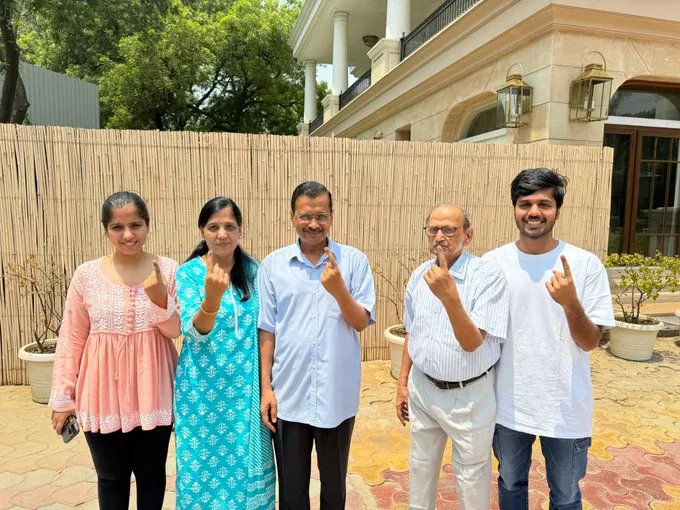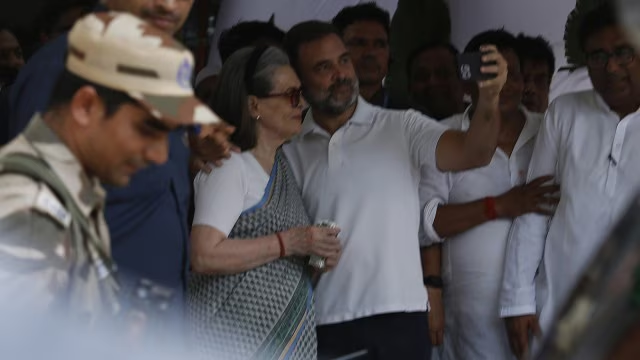The Congress and AAP had a pre-poll alliance in Delhi where the former is contesting in 3 seats, while the Arvind-Kejriwal led party is fighting in remaining 4.
When Sonia and Rahul Gandhi stepped into the Nirman Bhawan polling booth at 9.36 am Saturday, it was already history in the making. For the first time, the New Delhi Lok Sabha constituency didn’t have a Congress candidate, and the party’s ‘hand’ symbol wasn’t on the EVM display board. The AAP’s ‘broom’ was among the symbols displayed. 12 km away — and an hour and a half later — CM Arvind Kejriwal entered the Under Hill Road polling booth in Chandni Chowk constituency. AAP’s ‘broom’ was not there but it was the Congress’s ‘hand’.
In fact, Rahul Gandhi had already spoken about this “interesting” coincidence. “Kejriwal will press the Congress button and I will press the AAP’s…,” he had said at a rally last Saturday, asking supporters of both INDIA bloc partners to unite.
At 7.25 am, an AAP worker was setting up two desks outside the polling booth on Maulana Azad Road. “Others (workers) are just about to arrive,” he said. The booth worker wasn’t attired in customary AAP colours. BJP had also set up two desks across the road and voters, stepping out of their cars, were already assembled around the four BJP booth workers.
At 8 am, the turnout was sluggish before picking up slightly as residents of the Capital’s VIP enclave — families, first-timers, and government servants — began trickling into the polling station to join the Gandhis when it came to choosing between the BJP and the first political alliance of its kind in the city.
Adesh Kumar, a resident of the Akbar Road staff quarters who said he had been voting at the same polling booth since 1992, described the local voters in the VIP enclave as “silent”, questioning, however, the need for “any political alliance”.
“What message does this send out? That the Congress is not even strong enough to put up its candidate?… I don’t think there was any need for an alliance in Delhi. I feel this will still end up splitting the vote,” he said.
Parvesh Devi, another voter, also questioned the need for an alliance. Her husband, Ashok Kumar, said he had voted in half a dozen elections but this was the first time he had seen two parties come together against one in the city. “… They have come together for convenience; this only proves they are willing to go to any extent to win, nothing else,” he said.
While K K Jha said whether or not there was an alliance “did not matter” since his vote was “for development”. His daughter Madhu Kumari, a first-time voter, termed the alliance “just political” and said it did not impact her first vote.
There were, however, “staunch supporters” of both parties as well who stepped out to exercise their franchise. “I can’t say whether or not it will make a difference or who will win the election, but I support the alliance because it seems like the right thing to do,” said Shiv Charan.
Meanwhile, amid an entourage of escort vehicles and security personnel, Rahul and his mother arrived at Nirman Bhawan, walked briskly inside to cast their vote, emerging minutes later and taking their leave.
Outside, the INDIA desk had relocated to Janpath Road alongside the BJP’s. White ‘neta topis’ on their heads, these were blank, bereft of the ‘broom’, ‘hand’ or INDIA symbols.
“We had tried to stop Sonia ji here so we could welcome her and Rahul ji with a bouquet (of flowers) but they left,” complained a member manning the INDIA desk. “It would have sent a good message for the alliance had they stopped by,” he added.
As the noonday sun ascended above, a scooter stopped by the INDIA desk, asking how it was going. “Chal raha hai; public hai hi nahin. Sab ya to chhutti pe chale gaye ya shift ho gaye quarteron se (It’s alright; there just aren’t enough people. They have either gone on holiday or shifted residence from the (staff) quarters.”
Asked about the response that they had witnessed since they had set up their desk, one of them said it had been “good” and that their candidate, AAP’s Malviya Nagar MLA Somnath Bharti, had a “good chance of winning” even if this happened with a “small margin.” Bharti is up against BJP’s Bansuri Swaraj.
The scene outside the Under Hill booth is similar yet different. There is no AAP candidate in the Chandni Chowk constituency. The party is supporting Congress candidate J P Agarwal, who is up against BJP’s Praveen Khandelwal.
A little after 11 am, two black cars stop at the entrance. AAP convener Kejriwal arrived at the booth, accompanied by his wife Sunita and two children. His father, Gobind Ram Kejriwal, was also with him. His mother, Geeta Devi, Kejriwal, later said, was unwell and couldn’t vote.
“I have voted against dictatorship, against inflation, against unemployment. I would like to appeal to voters… it is very hot, but you should definitely vote and exercise your right,” he said as he stepped out of the booth.
For some who voted at the Civil Lines booth a little before or after Kejriwal, the absence of the broom on the EVM was not something they gave much thought to. “It anyway used to be just the Congress and the BJP in Delhi earlier, and the AAP came in later,” said Sunil Passi, 54, a resident of colony number 33 on Under Hill Road.
Anil, 32, an Under Hill Road resident who has a job in a private company, said: “In the jhuggies and colonies like ours, some Congress voters would have switched to AAP… now that they are together, the BJP stands to lose at least to some extent.”
For Shamsher Ali, 48, a driver, who waited at the booth while Kejriwal voted, Agarwal’s candidature from Chandni Chowk, of which the booth is a part, was important. “Purane neta hain… we have seen him around for a long while. Why should the alliance lead to any confusion over who to vote for?”


